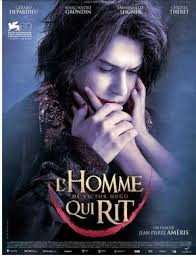
THE MAN WHO LAUGHS/L’HOMME QUI RIT
France, 2012, 95 minutes, Colour.
Gerard Depardieu, Marc- Andre Grondin, Emmanuelle Seigner, Christa Theret.
Directed by Jean- Pierre Ameris.
The Man Who Loves is based on the novel by Victor Hugo. It is set in pre-revolutionary times, the story of a boy who was disfigured so that his mouth looks as if he is laughing.
At the opening of the film, he is abandoned by the captain who disfigured him, leaving him to wander in the snow when he comes across a mother and daughter, rescuing the little child, eventually finding Ursus, who is a salesman of tonics in the French countryside. He is played by Gerard Depardieu, as usual, defective in his way.
Ursus cares for both children, finding that the little girl is blind. As he goes on his travels, spinning stories about his goods, bedding wives, he performs one day and the little boy comes out, mimicking him. Ursus does some quick thinking and says that the boy’s face is the result of devil possession and an exorcism.
The boy grows up (Marc- Andre Grondin), the girl is very attached to him, loving him. They arrive in Paris and find themselves in the middle of the circus, and becoming very successful with their performances in plaintive stories, using the boy and the girl. A countess comes to see the play and demands his presence. It emerges that the boy is son of a nobleman and inherits his castle. Overwhelmed by the luxury, he wants to do something for people and goes to Parliament where he is laughed at, something which happens also at the ball and his reception.
The majordomo who found the boy and realised who he was sends Ursus and the girl away. However, the young man seeks them out, only to find that the girl has tried to kill herself because of her love for him. And they go on their way.
1. A classic story, history, costume drama?
2. The re-creation of the period: the sea, winter and snow, the caravan, travelling the French countryside, the villages, the city, the circus, the castle, the Parliament? Costumes and sets? Decor? The musical score?
3. The title, Gwynplaine, his face cut, the cruelty of the captain, the doctor? The reason for the cutting of the boy’s face, the execution of his father?
4. The boy, at the boat, the captain sending him away, his walking through the snow, freezing, finding the baby and the mother, carrying the baby, finding the caravan of Ursus, being received, the little girl being blind? Travelling together, surviving, the passing of the years?
5. Ursus going into the village, his spiel, his potions, talking with the people, his knowledge, the woman and her knowledge, his credibility? The sexual encounter with the woman? Gwynplaine and his coming out on the platform, mimicking Ursus, the people laughing, Ursus and his quick thinking, the explanation of the exorcism, the effect on the boy’s face? The people paying up? On the road for years? The transition to the teenage Gwynplaine, to the blind Dea, the two growing up together, the bond, this love, sexuality dimension, the hesitation? Ursus and his watching over them.
6. Travelling to the city, the circus, the range of characters, their being accepted, the caravan in the midst, the performances? The development of the dramas? The stage, the sets, Gwynplaine and Dea both performing? The response of the crowds, the reputation?
7. The Duchess coming to watch? The response? Reaction?
8. Gwynplaine and his being commanded to go, been taken away, the majordomo of the castle? The revelation of the truth, his parents, the castle and his wealth? The story of his parents? The transformation, the bedroom, his clothes, people waiting on him, the meals? The pomp and circumstance? The effect? His wanting to go back to Ursus?
9. The apprehension of the captain, imprisoned, his confession?
10. Ursus and Dea, going to the Castle, their being sent away? Dea and her disappointment?
11. Gwynplaine and his being taken to court? The pomp and circumstance of the reception, and people laughing at him? Considering him a monster?
12. His taking his seat in Parliament, his speech, again the mockery and ridicule? His leaving?
13. Dea and her grief, going to the river, regretting Gwynplaine’s leaving? Taking the arsenic? Gwynplaine’s return, Ursus and Gwynplaine attending Dea and her death? The happiness of her final memories before dying? The burial?
14. Gwynplaine, Ursus and the future?